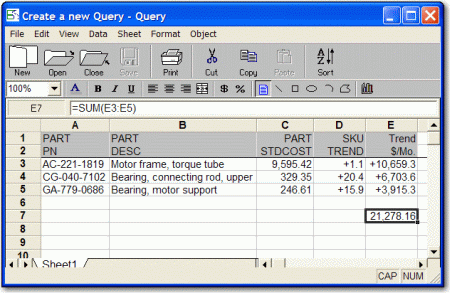from E/Step Software Inc.
Clients' needs always change over time, so FGS lets you change the structure of the database whenever you need to—not just during installation.FGS contains its own integrated extended network database. This is a superset of the usual relational database capabilities. All of the information from data imports and from its own computations resides here and is available for standard or custom analyses, reporting, or export.
FGS has facilities to interface bidirectionally with your other systems—whether they are huge mainframe ERP or home-grown client databases. We have yet to find a system that we couldn't link to. A recent feature is the ability to replicate easily a shadow database of FGS in Microsoft SQL Server or Oracle.
 FGS
includes a both query facility and a report writer in case you need to
do something which is not available in the scores of standard reports.
This is an example of an analyst scanning the database for SKUs with
trends in excess of $10,000 per month. The selection criteria for this
example would be (TREND TIMES STDCOST) > 10000. You can easily query or
filter any fields or calculated values. The results appear on a
spreadsheet. There are also many standard parameter-driven reports plus
a report writer with which to create your own.
FGS
includes a both query facility and a report writer in case you need to
do something which is not available in the scores of standard reports.
This is an example of an analyst scanning the database for SKUs with
trends in excess of $10,000 per month. The selection criteria for this
example would be (TREND TIMES STDCOST) > 10000. You can easily query or
filter any fields or calculated values. The results appear on a
spreadsheet. There are also many standard parameter-driven reports plus
a report writer with which to create your own.
The database stores time-phased information in bucketless format, allowing you to keep demand history by part, by location, by customer, and even by order.
The database includes a forms generator for customized record-by-record edits, as well as mass change and computational edits. We are often amazed by the innovative fields and their calculations created by our clients. This ability gives users the tools to make the database do whatever they want. Custom fields are no less capable than standard fields in how and where they can be used (selection, weighting, computations, etc.). The database also allows you to create any field as a key (indexed) field, and the keys are automatically updated by the system.
FGS includes a complete script facility with a learn mode (recorder) that allows you to create your own procedures. Anything you do regularly need be recorded only once. You may then edit the recorded script if necessary. The next time you need to do the process, you simply run the script. All of your processes can be automated, so you spend your time reviewing questionable forecasts and improving them—not looking for them. You can put FGS on a scheduler to run processes unattended—come to work the first day of each month with your forecasts processed and ready for your review!
FGS does not limit you to a single database, allowing you to test broad management directives to determine their enterprise-wide impacts before you commit to them. The same capability gives the analyst ultimate flexibility to research problems and solutions without disrupting ongoing operations.